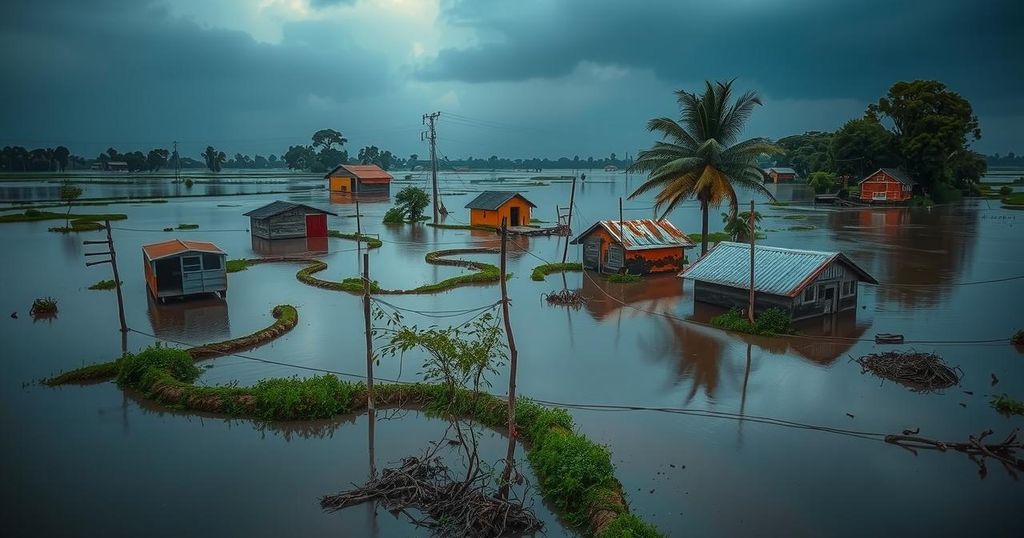Severe Flooding Deepens Health Crisis in South Sudan, WHO Reports

Severe flooding in South Sudan has displaced over 226,000 people and overwhelmed health services, with critical infrastructure submerged. Affected by climate change, the situation has worsened, following the arrival of 800,000 refugees from Sudan. The WHO is responding with emergency health kits and addressing outbreaks of cholera and malaria in flood-affected areas.
South Sudan is currently facing unprecedented flooding that is generating significant humanitarian challenges across the nation. According to the United Nations, severe inundation has led to the displacement of more than 226,000 individuals and has severely impacted both livelihoods and infrastructure, with 58 health facilities submerged and about 90 others rendered inaccessible. The flooding has affected 42 out of the 78 counties in South Sudan, with main roads, including vital routes leading to the capital Juba, being cut off. Approximately 890,000 people are reported to have been impacted as of early October 2024. The flooding, primarily occurring during the rainy season from April to November, has intensified due to climate change, overwhelming communities’ capacity to respond and resulting in permanent dislocation for some populations. The World Health Organization (WHO) indicated that the ongoing situation compounds existing humanitarian crises following the arrival of nearly 800,000 refugees and returnees seeking safety from conflict in neighboring Sudan. Recent concerns have arisen with the detection of two suspected cholera cases in Renk County, which is a significant entry point for many refugees. Additionally, malaria cases have surged, with over 120,000 reported along with 31 suspected fatalities by the end of September 2024. Dr. Humphrey Karamagi, the WHO Representative in South Sudan, stated, “People are in a heightened state of vulnerability due to multiple shocks. WHO is committed to working with the Ministry of Health and our partners to ensure that they have access to essential health services while also prioritizing the response to growing humanitarian and health needs.” In response to the crisis, the WHO has distributed approximately 88 metric tonnes of emergency health kits to various locations like Renk, Bentiu, Malakal, and Bor counties, which can provide treatment for over 870,000 individuals. These kits include essential medical supplies, such as cholera treatment and investigation kits, antimalarial medications, and snakebite antivenoms. Since January 2024, the WHO has also provided nearly 1,300 malaria kits nationwide and positioned additional cholera rapid diagnostic tests. The organization is actively collaborating with the Ministry of Health to enhance the emergency response and monitor health issues related to the floods, particularly vector-borne and waterborne diseases. To tackle the ramifications of climate change, the WHO is aiding nations in developing and implementing strategies to improve health systems’ resilience to environmental changes, thereby reducing carbon emissions from these systems while advocating for sustainable investments to strengthen infrastructure against future climatic shocks.
The flooding crisis in South Sudan is a tragic consequence of a combination of environmental factors exacerbated by climate change. This phenomenon not only underlines the vulnerability of the nation’s infrastructure but also sheds light on the critical health implications that arise from natural disasters. South Sudan, already grappling with significant humanitarian needs due to conflict-related displacements, faces challenges that threaten public health safety as seen with the recent cholera and malaria outbreaks. Understanding the interconnectedness of climate change and health is vital for implementing sustainable solutions that safeguard both the environment and the health of the population.
In summary, the severe flooding in South Sudan has created a humanitarian disaster, exacerbating pre-existing health crises and displacing thousands of individuals. The WHO is taking extensive measures to address immediate health care needs while simultaneously advocating for resilient health systems that can better withstand climate perturbations. The need for coordinated action by health agencies and the government is paramount to navigate the complexities of this ongoing emergency and protect vulnerable populations from further socioeconomic and health repercussions.
Original Source: sudantribune.com







